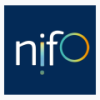The table below aims at gathering the administrative and governmental bodies of Belgium, which are responsible for digital public administration policies and interoperability policies.
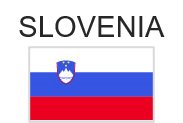
National
The Ministry of Digital Transformation was established on 24 January 2023. It monitors and analyses the state of digital transformation and the information society at national level. It is responsible for the areas of the information society, electronic communications, digital inclusion, digital competences, the data economy, management of information and communication systems, and fostering the digitalisation of public administration services.
In cooperation with the competent Ministries and government offices, the Ministry prepares, coordinates, and implements national measures and projects in the field of the information society and digital transformation of the economy, public administration, healthcare, justice, agriculture, education and other areas.
The Ministry of Digital Transformation took over the policies and strategies regarding eGovernment focusing on innovative and human-centric solutions and digital public services, together with the development and management of information systems previously carried out by the Information Technology Directorate within the Ministry of Public Administration.
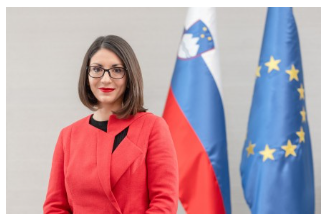
|
Minister Ministry of Digital Transformation
|
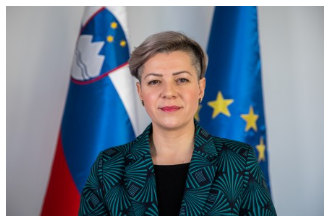
|
dr. Aida Kamišalić Katifić State Secretary Ministry of Digital Transformation
|
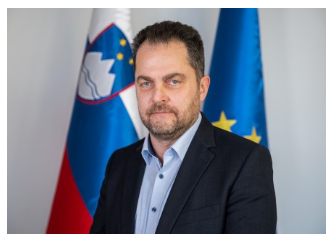
|
State Secretary Ministry of Digital Transformation
|
From 25 February 2022 the Council for the Informatics Development is again operational. It manages the development of information and communication systems of the State administration, as well as their financial resources. The members of the Council are representatives of Ministries, their constituent bodies and government departments.
The Council consists of a strategic group (State secretaries from certain governmental bodies) and an operational working group (heads of informatics in all bodies and government services of the State administration).
The Council has two main tasks:
-
Promoting the digitalisation and digital transformation in State administration and e-services related to State administration for the population of Slovenia and the Slovenian economy; and
-
Coordinating and issuing opinions on the eligibility of investments and projects of State administration bodies.
The Council will cease to function when the Ministry of Digital Transformation will fully take over its tasks, as stipulated by the latest amendment to the State Administration Act (Official Gazette of the Republic of Slovenia, No. 18 /23), ZDU-1O).
|
|
The Secretariat-General of the Government of the Republic of Slovenia is primarily responsible for conducting the sessions of the government, its working bodies, expert councils and other governmental bodies, and for monitoring the implementation of decisions adopted by the government and the obligations undertaken by or imposed on it.
One of the key tasks of the Secretariat-General is to ensure the smooth operation of information systems whose primary function is to support the decision-making processes. Electronic services and systems developed for this purpose facilitate the harmonisation of documents at different levels and the provision of information on government decisions to various target user groups and to the public.
|
|
The Ministry of Digital Transformation works with the ICT Association of Slovenia (ZIT) at the Chamber of Commerce and Industry. The association strives to connect public administration and ICT companies as well as to cooperate in marketing and implementing ICT solutions abroad. There are several cooperation initiatives, from 5G networks, eIdentity legislation, smart city solutions to the Artificial Intelligence National Strategy and the Open Data National Hub. The ZIT runs several sections, competence centres, initiatives and projects that support the ICT sector and the digitalisation of the economy in Slovenia. The key sections are:
-
ZITEX – the export section, organising activities to support the internationalisation of the industry;
-
AIDAS – section for data science and artificial intelligence to work on key topics on these very important areas for the country and common EU digital market;
-
SOEK – improving the business environment for telecom solutions providers and cooperating on the regulation on digital connectivity;
-
SeGov – cooperating with the government, connecting providers and exporting solutions;
-
S3P – promoting online-business and eCommerce, cooperating with the government offices in the field of financial regulation;
-
SeKV – networking in the field of cybersecurity;
-
ScienceTech – networking high technology companies for further cooperation with CERN, ESA, EUMETSAT, etc.;
-
eHealth – section working closely with Ministry of Health in developing Slovene eHealth system including the strategy, key goals and projects. Also working closely with all key stakeholders on the topic;
-
Initiatives of ICT Association of Slovenia;
-
Centre for eBusiness (EPOS), providing B2B support to SMEs with standards, tools and skills;
-
AI4Slovenia (AI4SI) – initiative to promote and support the transfer of knowledge of AI to industry, from research to use;
-
ICT Innovation Network - part of Smart Specialisation of Slovenia, supporting all vertical industries with digitalisation initiatives and projects;
-
Gaia-X Hub Slovenia - the central contact point for Slovenian companies, stakeholders, initiatives, associations, and public sector bodies contributing to the Gaia-X project and reference point for data spaces, and
-
OPSIHub - an initiative with the Ministry for Public Administration to promote public open data.
The Slovenian Digital Coalition includes stakeholders from trade and industry, science, education, public administration, public sector, local government and civil society. The Slovenian Digital Coalition is focused on attaining a cross-sector multiplier impact, accelerating the development of the digital society and leveraging opportunities for the development of ICT and the internet. In November 2020, the Slovenian Digital Coalition organised a forum showcasing three years of work and assessing the current state of play in the field of digital transformation. A wide variety of stakeholders took part in this forum and the topics discussed covered key areas in this field. There are three focus areas for the Digital Coalition:(i) digital economy; (ii) digital skills and education system, and (iii) regulatory and business ecosystem. Each area is supported by a coalition strategic working group. Furthermore, the Slovenian Digital Coalition established a project team on the topics of smart cities and society and blockchain. The coalition is also actively participating in different events, and it represents the point of view of businesses. It also highlights those areas which would require additional activities in order to keep on growing.
The Information Commissioner performs the duties of the national Data Protection Authority: it oversees the application of the rules on personal data protection (including the GDPR), the Personal Data Protection Act and the Act on the Protection of Personal Data in the Area of Treatment of Criminal Offences. It performs inspections and issues penalties with regards to violations of the above-mentioned laws. The Information Commissioner also acts as a body of appeal for resolving complaints from the data subjects regarding their rights, namely the right of access by the data subject, the right to rectification, the right to erasure, etc.
On the other hand, the Information Commissioner oversees the application of the Access to Public Information Act with regards to individual complaints when liable public sector bodies refuse access to public documents or refuse a request for reuse of public sector information. The role that the Information Commissioner has played is vital in ensuring a high degree of institutional transparency. The number of individual complaints is steadily growing every year, which shows that the awareness on the right to access to public information has risen also among Slovenian citizens. The Information Commissioner receives only a low number of complaints every year regarding the right to reuse public information when compared to the number of complaints raised over the refusal of access to public documents. This can be interpreted as evidence that government efforts to promote and enable the reuse of public sector information are working.
The Division for the Administrative Burden Reduction, Better Regulation and Quality in Public Administration, which is under the responsibility of the Ministry of Public Administration, seeks to improve regulations that are essential to creating a high-quality regulatory environment. Recognising the importance of introducing innovative approaches in State administration bodies, the Division promotes creativity, agile approaches, the involvement of stakeholders, the co-development of services and the testing of services with stakeholders, and regularly monitors user experiences. Efficiency and quality are promoted through the Inovativen.si Project whose main objectives are the uptake of innovative approaches and innovative methods of work by employees in the public administration.
The Resolution on Legislative Regulation gives the government a political commitment to respect the principles of good regulation and to involve the public in the process of formulating new policies or in the process of drafting new regulations. The resolution sets out the basis and principles for drafting regulations, as well as guidelines for conducting an impact assessment and cooperating with expert groups and other stakeholders.
The Information Society and Informatics Directorate at the Ministry of Public Administration works closely with the ICT Association of Slovenia (ZIT) at the Chamber of Commerce and Industry. The association strives to connect public administration and ICT companies as well as to cooperate in marketing and implementing ICT solutions abroad. There are several cooperation initiatives, from 5G networks, eIdentity legislation, smart city solutions to the Artificial Intelligence National Strategy and the Open Data National Hub.
The ZIT runs several sections, competence centres, initiatives and projects that support the ICT sector and the digitalisation of the economy in Slovenia. The key sections are:
- ZITEX – the export section, organising activities to support the internationalisation of the industry;
- SOEK – improving the business environment for telecom solutions providers;
- SeGov – cooperating with the government, connecting providers and exporting solutions;
- S3P – promoting online-business and eCommerce, cooperating with the government offices in the field of financial regulation;
- SeKV – networking in the field of cybersecurity;
- ScienceTech – networking high technology companies for further cooperation with CERN, ESA, EUMETSAT, etc.;
- Centre for eBusiness (EPOS), providing B2B support to SMEs with standards, tools and skills;
- AI4Slovenia (AI4SI) – a recently established initiative to promote and support the transfer of knowledge, from research to use, of AI in industry;
- ICT Innovation Network, part of Smart Specialisation of Slovenia, supporting all vertical industries with digitalisation initiatives and projects.
The Slovenian Digital Coalition includes stakeholders from trade and industry, science, education, public administration, public sector, local government and civil society. The Slovenian Digital Coalition is focused on attaining a cross-sector multiplier impact, accelerating the development of the digital society and leveraging opportunities for the development of ICT and the internet. In November 2020, the Slovenian Digital Coalition organised a forum showcasing three years of work and assessing the current state of play in the field of digital transformation.
A wide variety of stakeholders took part in this forum and the topics discussed covered key areas in this field.
There are three focus areas for the Digital Coalition:
- Digital economy;
- Digital competencies and education system;
- Regulatory and business ecosystem.
Each area is supported by a coalition strategic working group. Furthermore, the Slovenian Digital Coalition established a project team on the topics of smart cities and society, and blockchain. The coalition is also actively participating in different events, represents the point of view of businesses and points to areas, where additional activities would be necessary for further growth.
The Information Commissioner performs the duties of the national data protection authority - it oversees the application of the rules on personal data protection, including GDPR, Personal Data Protection Act and Act on the Protection of Personal Data in the Area of Treatment of Criminal Offences. It performs inspections and issues penalties with regards to violations of the named acts. The Information Commissioner also acts as a body of appeal for resolving complaints from the data subjects regarding their rights, namely the right of access by the data subject, the right to rectification, the right to erasure, etc.
On the other hand, the Information Commissioner oversees the application of the Access to Public Information Act with regards to individual complaints when liable public sector bodies refuse access to public documents or refuse a request for reuse of public sector information. The role that the Information Commissioner has played is vital in ensuring a high degree of institutional transparency. The number of individual complaints is steadily growing every year, which shows that the awareness of the Right to Access to Public Information has risen also among Slovenian citizens. The Information Commissioner receives only a low number of complaints every year regarding the right to reuse public information when compared to the number of complaints raised over the refusal of the access to public documents. This can be interpreted as evidence that government efforts to promote and enable the reuse of public sector information are working.
In accordance with the constitutional provisions, Slovenian municipalities and urban municipalities are autonomous in the field of introducing eSolutions. Local eGovernment initiatives are solely under the responsibility of local authorities, mostly municipalities, which implement them using their own mechanisms and time schedules.
Voluntary coordination is taking place in the framework of local government associations. For instance, the Association of Urban Municipalities of Slovenia established the Committee for Digitalisation and Smart Cities, which unites experts of the eleven urban municipalities. Cities exchange information on best practices, solutions and challenges and prepare position papers on State policies and public tenders. As the resources for implementing digital solutions at local level are limited, cities explore possibilities for cooperation in projects and initiatives that could be cofinanced by EU or State funds.
The Association of Municipalities and Towns of Slovenia (SOS) is another example of coordination of local self-government bodies. Besides working with bodies dealing with digital transition, the SOS coordinates access rights and offers support to the local authorities on the eTourism system. The SOS established a strategic partnership with the University of Ljubljana, which resulted in the creation of 4P Digital Innovation Hub(4PDIH). The aim of the 4PDIH is to foster awareness and provide services to grow digital skills, share digital experience and case studies locally, regionally and internationally, and support the government to adapt regulation and open its data to foster entrepreneurship.

